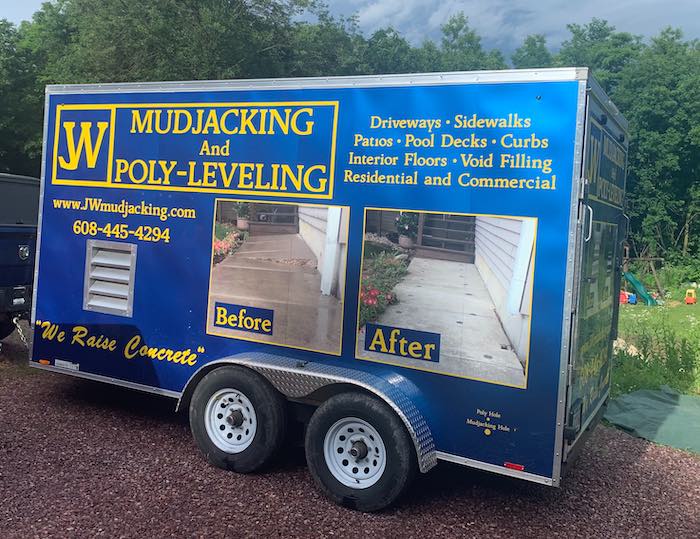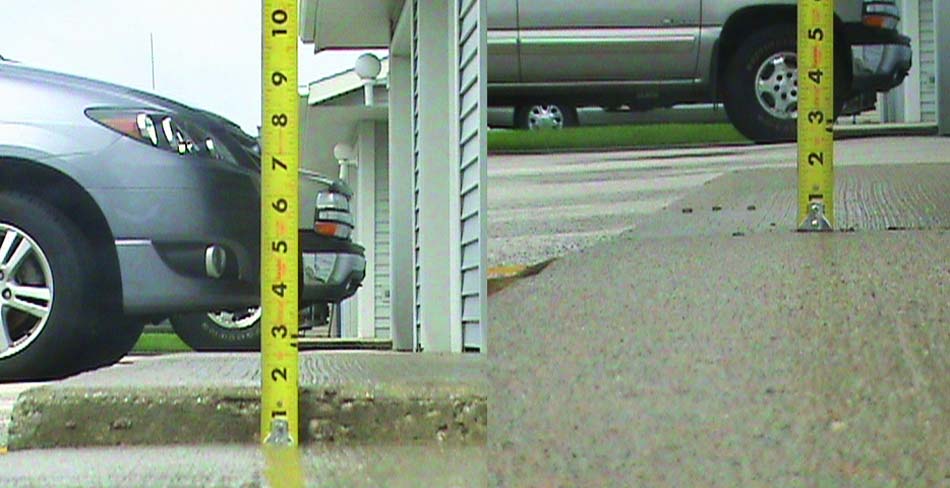MUDJACKING & CONCRETE LEVELING
We fix sinking concrete in the Stoughton & surrounding areas. Call or Text for a FREE Concrete Leveling estimate.
Sinking concrete in your garage or driveway can lead to major problems down the road. At JW Mudjacking, we offer expert driveway and garage floor leveling services to Stoughton and surrounding communities.
Uneven sidewalks are not only unsightly – they are a dangerous tripping hazard. Concrete leveling is an easy way to fix your sidewalks without replacing the concrete. Give JW Mudjacking a call to get started today!
You want your commercial property to look its best, and concrete leveling can help restore both indoor and outdoor surfaces. From loading docks to parking lots to concrete steps, we can mudjacking or polyjack to fix unlevel and sunken concrete for all types of business and commercial properties.
 How does concrete leveling work?
How does concrete leveling work?
Concrete leveling is just what it sounds like: a process by which sunken or uneven concrete is brought level. This can be done with a few different materials but uses the same process. First, small holes are drilled in the affected concrete. Then, a mixture is pumped through the holes to fill the space below the concrete until it becomes level. The material used can be a mud mixture (mudjacking) or a polyurethane mixture (polyjacking). The holes are then refilled and the concrete is ready to walk or drive on again within just a few hours.
What’s the difference between mudjacking and polyjacking?
The major difference between mudjacking and polyjacking is the mixture used to even the concrete. In mudjacking, a concrete/mud mixture is inserted in the space below the concrete slab until it becomes level. In polyjacking, a mixture made of polyurethane is used. Polyjacking is more environmentally friendly, efficient, and long-lasting than mudjacking but comes at a higher price. Give us a call to discuss what is right for your needs.
What concrete surfaces can be leveled?
At JW Mudjacking & Poly Leveling, we are proud to provide a full menu of concrete leveling services for both residential and commercial properties. Our expertise includes driveways, walkways, garage and warehouse floors, concrete steps, loading docks, and more. If your concrete is uneven, we can likely fix it.
How long until I can use the leveled area?
The amount of time you must wait before walking on a leveled concrete slab depends on the material used. Polyjacking is a quicker-drying process, normally drying within an hour, but any concrete leveling project dries within a few hours.
Can you level decorative concrete?
Yes. Any type of decorative concrete can be leveled using one of our proven effective strategies. In terms of restoring the area to its original look, we do our very best to match the color of the concrete fill to the existing material so the repair is virtually unnoticeable.
How long does concrete leveling last?
Both polyjacking and mudjacking are long-lasting solutions to uneven concrete. Polyjacking material is immune to erosion and should last indefinitely, though soil movement under the fill can be a problem. The concrete used in mudjacking is less long-lasting, but still should last from 5 to 8 years or more. No matter what material you choose, you can make the repair last longer by maintaining the concrete slab and filling any cracks that may appear. .
Why should I worry about uneven concrete?
Uneven concrete is not only unsightly, but it can also be a safety hazard. Cracked or uneven concrete surfaces are tripping hazards, and the pressure put on the soil underneath uneven concrete can put added weight on your building’s foundation and lead to moisture and mold issues down the road.
While it may not be the most fun repair, leveling your concrete can save you a lot of trouble and cost and make your home or commercial property a safer place for those who live and work in it.
Why shouldn’t I just replace my concrete?
Replacing concrete is an appropriate solution if the existing concrete is completely worn down or broken beyond repair. But for sunken or uneven concrete slabs that are otherwise in good condition, concrete leveling requires much less time for drying, labor, and is about half as expensive.
What is your concrete leveling service area?
JW Mudjacking & Poly Leveling serves customers in Madison, Portage, Sun Prairie, Wisconsin Dells, Baraboo, Lodi, Middleton, Waunakee, Stoughton, DeForest, Sauk City and surrounding areas.
Is there much cleanup necessary after concrete leveling?
There is very little cleanup, if any, needed after your concrete has been polyjacked. There may be small amounts of cement dust from the drilling of the holes in the slab, but that can be easily rinsed away with a garden hose. Because our equipment is small, we do not disturb your lawn or garden beds, and you’ll never even know we were there except your perfectly leveled concrete.
What maintenance is needed after concrete leveling?
There is only minor maintenance that will be needed after polyjacking your concrete, and it’s simple. The likely culprit for the sinking in the first place is that water got beneath your slab. The easiest way from preventing this from continuing the happen is to seal any gaps or cracks in the concrete. Cement caulk can be purchased from your local hardware store, and this will help keep out water in the future.
What will I notice after the concrete lifting?
We hope you’ll notice that your concrete is now straight and level! However, there may be other small differences you notice. When the concrete is lifted, small hairline fractures that were already there may become noticeable, and need to be filled with cement caulk. The small drill holes that are used to lift the slab will be barely discernible. Because you are keeping the same cement slab, the color will remain the same, unlike replacing concrete. What you’ll notice is that you’re not tripping over those pesky uneven slabs or seeing a gap between your steps and your home.
How long does polyjacking last?
The polyurethane foam that is used in the concrete lifting is solid material that is impervious to erosion caused by water, insects or rodents. The foam itself will last indefinitely, however there is always the possibility that your subsoil will continue to shift beneath, causing future sinking. By maintaining your concrete by filling cracks and gaps, the process will last longer.
Do I need to be home during the polyjacking process?
Most likely, no! The only time you would need to be home is if the slab that is being leveled is inside, such as a garage floor. Otherwise we can do the work whether you are home or not! This leaves you to go about your normal routine without having to worry about taking time off of work or putting off running errands.
Why should I worry about uneven concrete?
Uneven concrete can lead to many more problems than you probably realize. On top of being unsightly with crooked sidewalks or leaning steps, there can be problems lurking beneath. Stoughton gets a lot of rain per year, even by Midwestern standards. When your concrete is not properly graded away from your home or business, it can lead to water related issues. Flooding, pooling water, mold and even foundation issues can be costly to repair. If you have a walkway or driveway that is funneling water toward your home instead of away from it, it’s only a matter of time until you experience one or more of these problems.
Trips and falls are no joke, especially when they happen at a place of business. When you have uneven walkways or steps that are not longer level, these can lead to serious injury. JW Mudjacking makes sure your concrete is level so you can avoid these hazards.
If your concrete is sinking, chances are it will continue sinking until the integrity of the slab itself is compromised. Without leveling your sinking concrete in a timely manner, you may run out of time for it to be an option, and have to resort to costly concrete replacement. Save yourself the money and hassle of having to replace your concrete altogether by getting it polyjacked at the first sign of sinking trouble.
What is causing my concrete to sink?
There are a few reasons that your concrete can be sinking, but most of the time it is because of water. Soil erosion beneath the slab is the reason your concrete is sinking, and it could be because of rain water, runoff from a roof or a misplaced downspout, or even a pipe leaking beneath the slab itself. When water gets beneath the concrete, it will begin to wash away the soil, creating a void, or empty space. Because of the weight of the concrete, it will begin to settle and shift when these voids are present. Concrete Leveling finds these voids and fills them, leaving you with level concrete once again! So if you need void filling or concrete leveling, we are your guys!

How much does concrete leveling and polyjacking cost?
Our minimum job fee is $400. However the amount that the slabjacking is going to cost is completely dependent on the area that needs to be lifted and the size of the void(s) beneath the slab(s). When the size and scope is determined, we can give you a free, no obligation quote. However, most polyjacking repairs will cost a couple thousand dollars.
How do I know if I need slabjacking?
There are several signs that you have concrete that needs to be leveled, however the most obvious is that you can see a difference in height between slabs. If you have slabs that are next to one another that are no longer level, it means one or more of your slabs are shifting. Be sure to look at your driveway, sidewalks, patios, etc. from all sides to see if there is a height difference appearing.
If water is no longer running away from your home, then this is a good indication that your concrete has shifted and needs to be polyjacked. While you may not be able to visibly notice these changes, you may see that water is pooling in areas it didn’t before.
Do you notice a hollow sound while bouncing a ball on a large concrete slab? Then you’ve got a void! Even if your concrete hasn’t started settling yet, you may notice hairline fractures starting to appear as the weight of the concrete is no longer being supported.
What types of payment do you accept?
Cash or check is preferred. Credit card is accepted on bills under $2,000. We can also do ACH payments and Zelle.